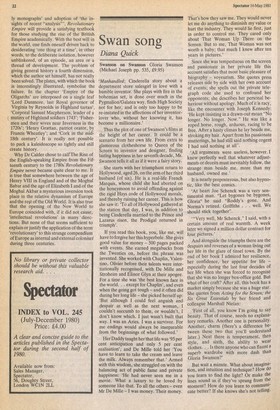Swan song
Diana Quick
Swanson on Swanson Gloria Swanson (Michael Joseph pp. 535, £9.95) 'Manhandled; Cinderella story about a department store salesgirl in love with a humble inventor. She plays with fire in the bohemian set, is done over much in the Pygmalion/Galatea way, finds High Society not for her, and is only too happy to be re-instated in the affections of her inventorlover who, without her knowing it, has become a millionaire.'
Thus the plot of one of Swanson's films at the height of her career. It could be a scenario from her own life. From extra to glamorous clotheshorse to Queen of the Screen to inventor and designer, finding lasting happiness in her seventh decade, Ms. Swanson tells it all as if it were a fairy story.
She starts with her triumphant return to Hollywood, aged 26, on the arm of her third husband (of six). He is a real-life French Marquis, whose child she had aborted on the honeymoon to avoid offending against the rigid Hays code of Hollywood morals, and thereby ruining her career. This is how she saw it: `To all of Hollywood gathered at the station that day, I was, in addition to being Cinderella married to the Prince and Lazarus risen, the Prodigal returned in triumph'.
If you read this book, you, like me, will have to forgive her this hyperbole. She gives good value for money — 500 pages packed with events. She earned megabucks from the Twenties on, before the phrase was invented. She worked with Chaplin, Valentino, Olivier before their talents were internationally recognised, with De Mille and Stroheim and Elinor Glyn at their apogee. For a time she was 'the best known face in the world. . except for Chaplin', and even when the going got tough — and it often did during her long life — she picked herself up: 'But although I could feel anguish and despair as well as the next woman, I couldn't succumb to them, or wouldn't, I don't know which. I just wasn't built that way. I was an Aries. I was a survivor. For me endings would always be inseparable from the beginnings of what followed.'
Her Daddy taught her that life was '95 per cent anticipation and only 5 per cent realisation', and De Mille told her 'You have to learn to take the cream and leave the milk. Always remember that.' Armed with this wisdom, she struggled on with the balancing act of public fame and private happiness: 'He had never seen me in a movie. What a luxury to be loved by someone like that. To all the others — even Mr De Mille — I was money. Their money. let me do anything to diminish my value or hurt the industry. They would lie first, just in order to control me. They cared only about That Woman Up There on the Screen. But to me, That Woman was not worth a baby; that much I knew after ten years in pictures.'
Since she was tempestuous on the screen and passionate in her private life this account satisfies that most basic pleasure of biography — voyeurism. She quotes press releases side by side with her own account of events; she spells out the private tele graph code she used to confound her opponents; she describes her personal be haviour without apology. Much of it is racy, like the encounter with Joseph Kennedy: 'He kept insisting in a drawn-out moan "No longer. No longer. Now." He was like a roped horse, rough, arduous, racing to be free. After a hasty climax he lay beside me, stroking my hair. Apart from his passionate mutterings, he had still said nothing cogent I had said nothing at all'.
'All arguments were useless, however. I knew perfectly well that whatever adjust ments or deceits must inevitably follow, the strange man beside me, more than my husband, owned me.'
It is nearly preposterous, but also hypnotic, like the best comics.
'At heart Joe Schenck was a very sentimental man. "Let bygones be bygones, Gloria" he said "Roddy's gone. And Norma's retired. Griffiths . . . well. We should stick together".
"Very well, Mr Schenck," I said, with a certain amount of real warmth. A week later we signed a million dollar contract for four pictures.'
And alongside the triumphs there are the despairs and reverses of a woman living out her life in the glare of tinsel town. By the end of her hook I admired her resilience, her confidence, her appetite for life — especially during the last four decades of her life when she was forced to recognise that she was no longer box-office gold. But what of her craft? After all, this book has a market simply because she was a huge star. She quotes from Acting for the Screen; the Six Great Essentials by her friend and colleague Marshall Nielan: 'First of all, you know I'm going to say beauty. That of course, needs no explanatory remarks. Another one is personality. Another, charm (there's a difference between these two that you'll understand later.) Next there is temperament, then style, and sixth, the ability to wear clothes. . . Is there anyone who can flaunt a superb wardrobe with more dash than Gloria Swanson?'
But wait a minute. What about imagination, and intuition and technique? How do you learn to find the light? Or make the lines sound as if they've sprung from the moment? How do you learn to communicate better? If she knows she's not telling.










































 Previous page
Previous page